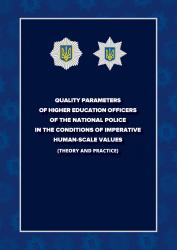Combating violent crimes against children: challenges for Ukraine, international experience, innovative methods of practical learning
Keywords:
communicative competence, National Police of Ukraine, human rights and freedoms, ethical principles, interaction, personnel policy, convention, rules (codes) of ethical behavior, psychological contact, reform, humanity, police deontology, leader, law enforcement system, courage, police ethics, leadership, law enforcement agencies, honesty, corruption, self-organization, law and order, responsibility, child protection, self-development, professional identity, justice, minor, narrative professional ethics, legal and psychological foundations official activities, respect, traumatic events events, trust, professional activity, moral behavior, stress, police, service training, legal basis of professional ethics, child-friendly room, National Police of Ukraine, professional training of a police officer, ethical principles, psychological safety g compliance, personnel policy, professional selection, rules (codes) of ethical behavior, resilience, reform, training of police officers, police deontology, psychological resources, law enforcement system, professionalization of law enforcement officers, police ethics, education, law enforcement agencies, personality of a police officer, corruption, EU educational policy, law and order, value experience, child protection, education applicant, professional identity, competence, minor, transformational learning, legal and psychological foundations official activities, communicative competence, traumatic events events, forms and methods of education, professional activity, interaction, stress, education quality, service training, psychological contact, child-friendly room, assessment, professional training of a police officer, leader, psychological safety g compliance, police performance assessment, professional selection, leadership, resilience, departmental assessment, training of police officers, self-organization, psychological resources, assessment procedure, professionalization of law enforcement officers, self-development, education, work program of the academic discipline, personality of a police officer, narrative professional ethics, EU educational policy, assessment methods, value experience, moral behavior, education applicant, criterion analysis, competence, legal basis of professional ethics, transformational learning, assessment criteria, forms and methods of education, learning outcomes, education quality, behavioral diagnostics, assessment, workshop, police performance assessment, psychological training, departmental assessment, psycho-pedagogical support, assessment procedure, pedagogical skills, work program of the academic discipline, pedagogical skills of a higher school teacher, assessment methods, advanced training of scientific and pedagogical personnel, criterion analysis, assessment criteria, learning outcomes, behavioral diagnostics, workshop, psychological training, psycho-pedagogical support, pedagogical skills, pedagogical skills of a higher school teacher, advanced training of scientific and pedagogical personnelAbstract
Chapter 6, based on the analysis and generalization of constructive foreign experience and the legal practice of Ukraine, outlines the key aspects of countering violent crimes against children and specifies innovative methods of training students of higher education in this direction in the practice of Ukraine. A comparative analysis of experience in the investigation of violent crimes against children is conducted and the possibilities of its implementation into the legal practice of Ukraine are determined. The peculiarities of the organization of detection of violent crimes against children on the basis of legal knowledge for the purpose of educational work and prevention of countering violent crimes against children are highlighted. In order to improve the quality of the teaching of such academic disciplines as "Criminal Studies", "Criminology", "Criminal Law", "Operative and Investigative Activities" in the training process of legal experts, the methodological features of the use of information and technical support for the detection, investigation and prevention of violent crimes against children in "Child-Friendly Interview Room". Mechanisms to prevent re-traumatization of the child's psyche during the interview process are substantiated thanks to special methods and the creation of a psychologically comfortable atmosphere.

QUALITY PARAMETERS OF HIGHER EDUCATION OFFICERS OF THE NATIONAL POLICE IN THE CONDITIONS OF IMPERATIVE HUMAN-SCALE VALUES
Downloads
Pages
Published
Categories
License

This work is licensed under a Creative Commons Attribution-NonCommercial-NoDerivatives 4.0 International License.

